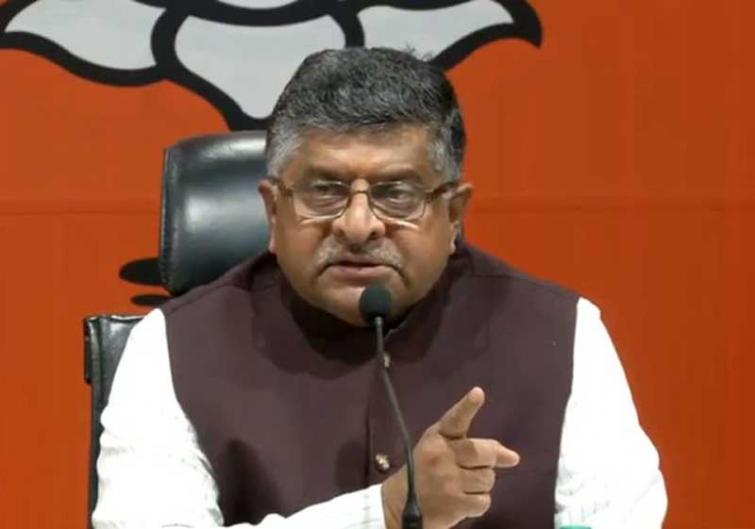 Ravi Shankar Prasad
Ravi Shankar Prasad Electronic & smartphone manufacturing sector alone will contribute $ 1 trillion to economy by 2025: Ravi Shankar Prasad
Kolkata/IBNS: Union Minister of Law and Justice, Electronics and Information Technology and Communications Ravi Shankar Prasad on Friday stated that there is a robust future for the manufacturing of electronics and smartphone sector in India.
“We have come a long way from the just two factories in 2014 to 250 manufacturing factories today. By proper scaling of the manufacturing, the sector alone can contribute $1 trillion towards fulfilling the dream of achieving the $5 trillion economy,” said Prasad. About 6 lakhs direct jobs have been created by the sector so far, he added.
He made this statement at the ASSOCHAM Foundation Week in a session- “Digitalization roadmap to support growth of the Indian economy” organized by The Associated Chambers of Commerce and Industry of India (ASSOCHAM).
Speaking about policies, he said that the right policies make a mark difference in the output and growth of the sector.
“The production Linked Incentive Scheme (PLI) that we introduced to the sector during the Covid pandemic, attracted top 5 global players to India as expected by us. And also the top 5 companies in India will be able to perform better. I am confident that these companies together will be managed to produce mobile phones and accessories worth Rs.10 lakh crore in the next five years,” said Prasad.
He informed that out of that the exports figure would be Rs 7 lakh crore and the sector will generate employment of 9 lakhs jobs directly or indirectly.
Talking further, about the future of electronics manufacturing in India, he said that by 2025 the country would be able to manufacture 1 billion phones, 50 million televisions, 50 million hardware including Laptops and tablets and other accessories. “The idea is to make India a global hub of mobile manufacturing as India has talent, innovation, and potential to be so,” he added.
Clearing the government's stand on data management and security, Prasad reiterated that data is going to drive the future of the world and data management, data innovation and data refining are going to be the important businesses in the future. “Our aim is to make India as a top global nation in data refining and data innovation,” he said.
About the data security he said that India stands firm on the decision that data from the citizens should be used with the consent of the person and without it. “It is the fiduciary’s responsibility to use the data for the purpose for which it is been taken and not otherwise,” he warned.
“India should not compromise on its data sovereignty. as India is an emerging economy and there would be fierce competition to get hold of the data. Indian’s, therefore, should be able to utilize their creative minds to have edge and power play in this emerging data economy sector, and establishing India as a global player in the world,” he stated.
He further added that the digital ecosystem in India will only work if there the common people of the country are made stakeholders.
“The technology like artificial intelligence (AI) should be used in areas like farming and healthcare, to benefit the people at large, and then only the ecosystem will survive,” he cautioned.
Prasad also spoke at length about inclusive digital India powered by technology and the role it played during the lockdown. “The aim is to empower an ordinary citizen to digital technology by the homegrown, low-cost technology and truly achieve inclusiveness.
Niranjan Hiranandani, President ASSOCHAM said, “The areas of emerging technologies offer a dual opportunity for us in India. On the one hand, there is an opportunity for India to emerge as a leader in the design and development of products and services in new and emerging technologies. On the other hand, the application of advanced technologies has the potential to create improved access for Indian companies to global markets, new employment opportunities and efficiency improvement.”
Kulmeet Bawa, President and Managing Director, SAP India, “India has a huge demographic advantage, a young talent pool, and a significantly expanding the domestic market” said Sh. Kulmeet Bawa, President and Managing Director, SAP India “The vision of AtmanirbharBharat can be greatly facilitated through digital enablement of citizens, businesses and government and by addressing key fundamentals such as enabling MSMEs, up-skilling workforce, and leveraging emerging technologies to manage supply chain disruptions. SAP is committed to taking India’s digital agenda forward.”
P. Balaji, Chairman - ASSOCHAM National Council on Digital Communications, and Chief Regulatory and Corporate Affairs Officer at Vodafone Idea Limited, “Telecom connectivity will be the platform for the digital society of New India. Operators such as Vi are focused on building digital networks to keep people, enterprises, and the economy running. We are increasing network bandwidth, leveraging digital technologies, to support customers and help India achieve the government target of a $1 trillion digital economy."
Support Our Journalism
We cannot do without you.. your contribution supports unbiased journalism
IBNS is not driven by any ism- not wokeism, not racism, not skewed secularism, not hyper right-wing or left liberal ideals, nor by any hardline religious beliefs or hyper nationalism. We want to serve you good old objective news, as they are. We do not judge or preach. We let people decide for themselves. We only try to present factual and well-sourced news.







